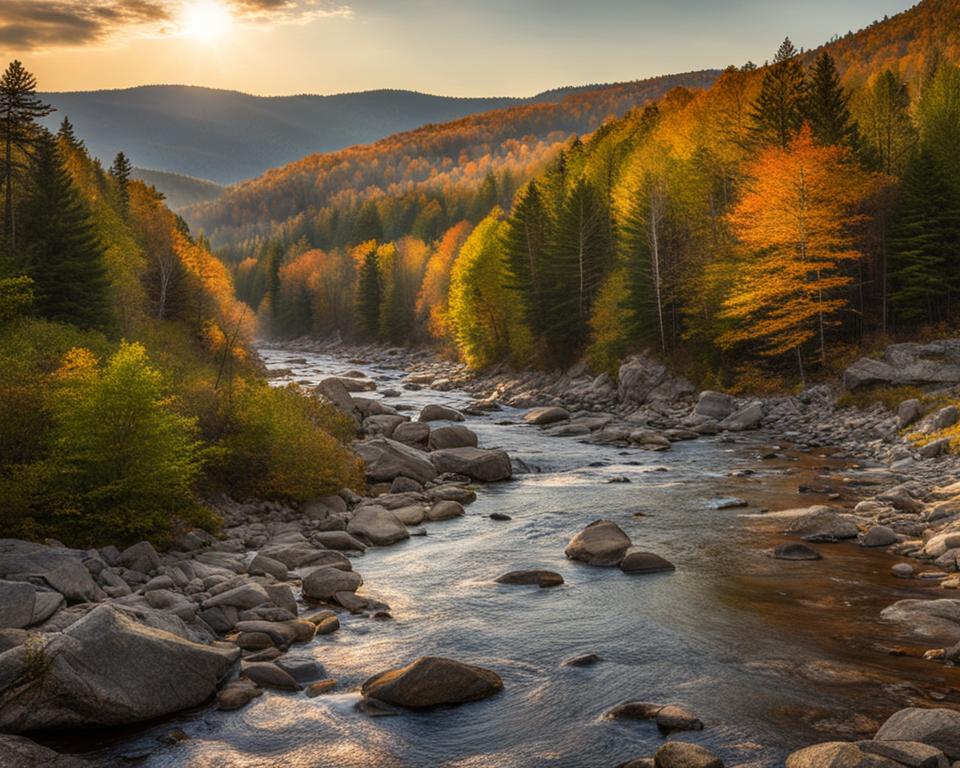
Disclosure: This Post Contains Affiliate Links; We earn a commission on purchases.
If you’ve ever wondered whether there is gold in Vermont, the answer is yes.
While the state may not be known for large-scale gold mining, there are deposits of gold that have been found in various locations throughout Vermont.
Historically, farmers in Plymouth discovered placer gold in Broad Brook, but they soon realized that farming was more profitable.
Today, there are reports of small amounts of placer gold found in creeks and rivers across the state, but it mainly exists in the form of small flakes and pickers.
Gold prospecting in Vermont typically involves methods such as panning and sluicing.
However, it’s important to note that permission from landowners and compliance with state regulations are required for gold prospecting in Vermont.
Key Takeaways:
- Vermont does have gold deposits, although not economically viable for large-scale mining.
- Gold mainly exists in the form of small flakes and pickers in creeks and rivers across the state.
- Common methods for recovering gold in Vermont include panning and sluicing.
- Permission from landowners and compliance with state regulations are required for gold prospecting in Vermont.
- Recreational gold panning is a popular activity in Vermont, providing outdoor enthusiasts with the opportunity to explore the state’s natural resources.
Where can you find gold in Vermont?
If you’re interested in gold prospecting in Vermont, there are several areas where gold has been found. These locations offer potential for recreational gold panning and exploration. Keep in mind that many of these streams and rivers are on private land, so permission from landowners is crucial before starting your search. Remember to adhere to state regulations and obtain the necessary permits.
Some noteworthy locations for gold prospecting in Vermont include:
- Ottauquechee River near Bridgeport
- Shady Rill Brook in Wrightsville
- Rock River in Newfane and Dover
- Minister Brook in Worcester
- Williams River in Ludlow
- White River in Stockbridge and Rochester
- Mad River in Warren
- Lamoille River in Johnson
- Little River and Gold Brook in Stowe
- Gihon River in Eden
- Missisquoi River in Lowell
While these locations have seen previous reports of gold findings, it’s important to manage your expectations. Gold deposits in Vermont are not significant enough to support large-scale mining operations. However, recreational gold panning can be an enjoyable and rewarding outdoor activity in these areas.
Please note that regulations and restrictions may vary depending on the location. The use of larger equipment like sluice boxes and dredges may be restricted or prohibited in certain areas. Always check with the Vermont Department of Environmental Conservation for the most up-to-date information.

Remember to respect the environment and leave the areas as you found them. Happy gold prospecting!
Historic Sites Linked to Gold Mining in Vermont
While Vermont may not have experienced a gold rush or significant gold mining industry, there are a few historic sites in the state that are linked to gold mining. These sites offer a glimpse into Vermont’s mining history and the small-scale gold operations that took place in the past.
The Elizabeth Copper Mine, located in South Strafford, operated during the 19th century and was primarily a copper mine. However, it also yielded small amounts of gold. The mine played a crucial role in Vermont’s mining industry, contributing to the state’s economic growth during that era.
The Egan Quarry, situated in Barre, is more commonly associated with granite extraction. However, occasional discoveries of gold were reported at this quarry. This dual productivity made the Egan Quarry an intriguing location for mining enthusiasts.
Although the Elizabeth Copper Mine and the Egan Quarry are no longer active mining operations, they hold historical significance and serve as reminders of Vermont’s mining heritage. These sites offer visitors an opportunity to explore the remnants of the past and appreciate the relationship between mining and Vermont’s rich geological resources.
Gold Prospecting in Vermont for Recreational Purposes
While Vermont may not have enough gold deposits to support large-scale mining operations, it offers ample opportunities for recreational gold prospecting. Individuals can indulge in the exciting outdoor activity of panning for gold in designated areas across the state. With the appropriate permits and adherence to state regulations, recreational prospectors can immerse themselves in the thrill of Vermont’s gold exploration.
Recreational gold panning allows enthusiasts to gain firsthand experience in searching for this precious metal. The serene beauty of Vermont’s natural surroundings enhances the experience, making it more enjoyable for both new and seasoned prospectors. It’s essential to note that gold panning in Vermont is primarily intended for recreational purposes and likely to yield smaller quantities of gold.
When engaging in recreational gold prospecting in Vermont, it’s crucial to obtain the necessary permits and follow state regulations. This ensures the activity is conducted responsibly and respectfully, preserving the environment for future generations. By respecting these guidelines, prospectors can contribute to the conservation of Vermont’s natural resources and continue the legacy of recreational gold panning.
Tips for Recreational Gold Panning in Vermont
1. Obtain the required permits: Before setting out to prospect for gold, secure the necessary permits from the Vermont Department of Environmental Conservation. This ensures compliance with state regulations and supports responsible mining practices.
2. Identify appropriate areas: Look for designated areas with exposed bedrock, gravel bars, or areas with a history of gold discoveries. These locations offer higher chances of finding gold flakes or pickers.
3. Basic tools: Equip yourself with essential tools such as a gold pan, shovel, and classifier. These tools help separate heavier materials from lighter sediment, facilitating the extraction of any gold found.
4. Practice the panning technique: The swirling motion is key to separating gold from other materials. Slosh the pan of gravel and sediment, allowing the lighter material to wash away while retaining any gold that settles at the bottom of the pan. Practice this technique to enhance your chances of finding gold.
5. Respect the environment: Leave the prospecting area as you found it, disposing of waste and rubbish responsibly. Minimize your impact on the environment by avoiding areas with delicate ecosystems or protected species, and follow any additional guidelines for each specific location.
By following these tips and enjoying the experience responsibly, recreational gold panning in Vermont can be a rewarding and memorable outdoor adventure.
| Benefits of Recreational Gold Panning in Vermont | Considerations for Recreational Prospectors |
|---|---|
| + Opportunity for outdoor adventure | – Quantities of gold found are typically small |
| + Engaging activity for individuals and families | – Need for permits and compliance with regulations |
| + Chance to learn about geology and mining history | – Restricted use of larger equipment in some areas |
| + Connection with Vermont’s natural resources | – Need for landowner permission to prospect on private land |
Tips for Gold Panning in Vermont
When it comes to gold panning in Vermont, there are a few key tips to keep in mind to maximize your chances of success. Here are some helpful suggestions to enhance your gold prospecting experience:
Finding the Right Locations
If you’re interested in gold panning, look for areas in Vermont with exposed bedrock or gravel bars in streams and rivers. These are the ideal spots where gold particles can accumulate over time. Some popular locations for gold prospecting in Vermont include the Ottauquechee River near Bridgeport, Shady Rill Brook in Wrightsville, and Rock River in Newfane and Dover.
Obtain Proper Permissions and Permits
Prior to embarking on your gold panning adventure, ensure you have obtained permission from landowners and acquired the necessary permits from the Vermont Department of Environmental Conservation. Respecting private property rights and following state regulations are essential for responsible gold exploration in Vermont.
Use the Right Tools
When gold panning in Vermont, it’s crucial to have the right tools at hand. Basic equipment like a gold pan, shovel, and classifier can help you effectively separate the heavier material from the lighter sediment. These tools are designed to make your gold prospecting experience more efficient and enjoyable.
Master the Swirling Technique
One of the fundamental techniques in gold panning is the swirling motion. Practice the swirling technique to wash away lighter materials and concentrate the heavier gold at the bottom of your pan. By mastering this technique, you can increase your chances of finding those elusive gold flakes and pickers.
Respect the Environment
As you engage in gold panning, it’s important to leave the area as you found it, respecting and preserving the natural surroundings. Properly dispose of any waste material and avoid damaging the environment during your gold exploration activities.
By following these tips, you can enhance your gold panning experience in Vermont. Remember, while the gold resources in Vermont may not be significant for large-scale mining, recreational gold panning can still offer a rewarding adventure in the great outdoors.
References
- https://www.goldrushnuggets.com/goldinvermont.html
- https://www.vermonter.com/get-rich-panning-gold-vermont/
- https://dec.vermont.gov/sites/dec/files/geo/MiscPubs/GoldInVT_1998.pdf
Conclusion
Although Vermont is known for its picturesque landscapes and outdoor activities, large-scale gold mining is not a viable industry in the state. However, Vermont offers a unique opportunity for recreational gold panning, allowing enthusiasts to explore the natural beauty of the region and try their luck at finding small traces of gold.
When engaging in gold prospecting in Vermont, it’s crucial to adhere to state regulations and obtain the necessary permits. This ensures that the activity is carried out responsibly and in harmony with the environment. Remember, Vermont’s gold resources are relatively limited, so any gold found is likely to be small and insignificant.
Vermont’s gold panning community is a tight-knit group of individuals who share a passion for the outdoors and the thrill of the hunt. Whether you’re a seasoned prospector or a beginner, Vermont offers ample opportunities to experience the joy of panning for gold. So grab your gold pan, follow the rules, and have a great time exploring Vermont’s rich natural resources!

Meet Ryan Conlon, the passionate owner and driving force behind Pan for Treasure.
With an unwavering love for the art of gold panning, Ryan has transformed his enthusiasm into a thriving community hub for fellow treasure seekers. [email protected]
A seasoned gold panning enthusiast, Ryan’s journey began with a simple pan and a dream, evolving into a deep appreciation for the history, geology, and thrill of uncovering precious metals.
Subscribe to Our Newsletter
